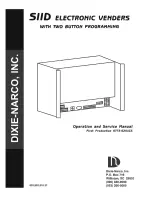
18
KNOWING YOUR SEWING MACHINE
———————————————————————————————————————————————————————————————————————————————————
c
Fully insert the spool of thread for the bobbin
onto the spool pin.
Slide the spool onto the pin so that the spool is
horizontal and the thread unwinds to the front
at the bottom.
d
Slide the spool cap onto the spool pin.
With the slightly rounded side of the spool cap
positioned toward the left, slide the spool cap
onto the spool pin as far as possible to the right
so that the spool is moved to the right end of
the spool pin.
Memo
●
When sewing with fine, cross-wound
thread, use the small spool cap, and leave a
small space between the cap and the spool.
a
Spool cap (small)
b
Spool (cross-wound thread)
c
Space
e
While holding the spool with your right hand,
and then pass the thread under the thread
guide.
a
Thread guide
f
Pass the thread under the thread guide cover
from the back to the front.
Hold the thread with your right hand so that
there is no slack in the thread that is pulled out,
and then pass the thread under the thread
guide cover with your left hand.
a
Thread guide cover
●
If the spool or the spool cap is not positioned
correctly, the thread may become tangled
around the spool pin or the machine may be
damaged.
●
Three spool cap sizes are available, allowing
you to choose a spool cap that best fits the
size of spool being used. If the spool cap is too
small for the spool being used, the thread may
catch on the slit in the spool or the machine
may be damaged.
CAUTION
a
c
b
















































